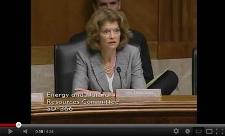Murkowski: Imitating China is Not the Best Way to Compete with China
WASHINGTON, D.C. – U.S. Sen. Lisa Murkowski, R-Alaska, today highlighted the fundamental differences between the United States and China in measuring which country is leading the race to develop alternative energy technologies.
(Click for video of Murkowski’s full opening statement)
“We hear claims that the United States is somehow ‘falling behind’ China in a ‘clean energy race.’ In so many ways, we are not falling behind. From the wages and conditions for our workers to our environmental standards and capacity for innovation, the United States is leading,” Murkowski said.
Murkowski’s comments came during Thursday’s hearing before the Senate Energy and Natural Resources Committee on America’s competitiveness with China in developing “clean” energy technologies.
“We can and should work with China to make progress on our energy challenges. But we should not merely copy what they do or how they do it. Imitating China is not the best way to compete with China,” Murkowski said. “This is particularly true for energy technology subsidies as we work to get our debt under control. I have long advocated for funding clean tech research efforts with revenues from conventional energy. This is far more sustainable than the approach taken by China.”
While many have complained that America is losing the clean energy race to China, Dr. Derek Scissors, a senior research fellow at the Heritage Foundation, testified that the United States is indeed winning the innovation battle.
(Click to play video)
“Most people would say spending more money is bad unless you get something for it – and the Chinese aren’t,” Scissors said. “We want to save money, we want to spend as little as possible and do as well as possible.… We started with clean energy because we were concerned with carbon emissions…. The U.S. is doing pretty well and China is doing terribly.”
For all the talk of China’s advances in clean energy manufacturing, the country is struggling with environmental challenges. Murkowski said this experience should serve as a cautionary tale against trying to create a clean energy sector through government mandates. “The unfortunate irony of all this is that America has often relied upon the cheaper, dirtier manufacturing practices of China in order to affordably comply with requirements we’ve imposed on ourselves for cleaner, pricier energy here at home,” Murkowski said.
###










